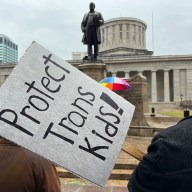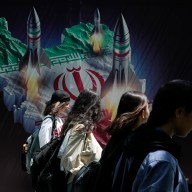BEIJING – The subversion trial of a Chinese activist who had investigated the deaths of thousands of schoolchildren in a massive earthquake opened on Tuesday, as police detained and threatened the man’s supporters.
Tan Zuoren’s trial comes amid growing reports of detentions and trials of dissidents and activist lawyers in an apparent crackdown to stifle dissent ahead of the sensitive 60th anniversary of the Communist state’s founding on Oct. 1.
Tan’s trial comes one week after hearings opened in the trial of Huang Qi, a prominent dissident who had criticized the government’s response to last year’s earthquake in Sichuan province and is accused of revealing state secrets. Separately, Xu Zhiyong, a legal activist who has tackled some of China’s most politically sensitive cases, was detained last week.
Tan’s subversion charges are believed linked to his quake investigation as well as essays he wrote about the 1989 student-led demonstrations in Tiananmen Square that ended in a deadly military crackdown.
Beijing routinely uses such broad and vaguely defined accusations to imprison dissidents, sometimes for years.
Tan, 55, pleaded not guilty in the three-hour session at the Chengdu Intermediate Court that ended with no immediate ruling, his lawyer Pu Zhiqiang said.
One of the accusations against Tan is that he contacted a former leader of Tiananmen pro-democracy demonstrations, Wang Dan, who lives in exile in the U.S. and is described in the court indictment as a “hostile overseas element.”
In a statement issued Wednesday, Wang said the two had emailed each other but that was within their right to freedom of expression as guaranteed by the Chinese constitution.
“I express strong opposition to such a ridiculous charge,” Wang’s statement said.
Artist and government critic Ai Weiwei, who had been consultant for the futuristic Beijing Olympics’ Bird’s Nest stadium, said he travelled to Chengdu with others to attend Wednesday’s hearing as a show of support for Tan.
However, he said at least four uniformed and plainclothes police armed with guns and batons broke into his hotel room before dawn and took him and 11 others away to another hotel.
Ai said that when he questioned the officers, one of them struck him on his right cheek, leaving a swollen bruise.
“They said, ‘If we need, we can beat you to death,”‘ Ai said in a telephone interview earlier Wednesday.
About 20 officers guarded them until about an hour after Tan’s trial ended, Ai said. Seven of them were released, including himself, he added, but police would not say where and why the other five were still being held. Calls to the city’s public security bureau rang unanswered.
A monitoring group, China Human Rights Defenders, said about 500 supporters also gathered at the court house, where they were met by about 100 policemen. The supporters were told they could not enter because they lacked the required passes, although clerks had earlier told them no passes would be necessary, the group said.
It said that apart from Tan’s lawyers, only his wife, daughter, and one friend were allowed in.
Ai said he believed the authorities were trying to silence Tan for his investigation into the collapse of schools in the 7.9-magnitude earthquake that struck in May 2008, leaving almost 90,000 dead or missing. Tan estimated at least 5,600 students were among the dead.
Critics allege that shoddy construction, enabled by corruption, caused several schools to collapse while buildings nearby remained intact – a politically sensitive theory that the government has tried to quash.
A prominent critic of Beijing’s policies, Ai later dissociated himself from the Bird’s Nest design and denounced the 2008 Olympics as a fig leaf for China’s social and political problems. The artist, whose father was the famous modern Chinese poet Ai Qing, is renowned for his avant-garde photographs and sculptures that have been exhibited around the world.
“I have now seen that this society is headed for a total and irreversible collapse,” Ai, 52, said. “They’re showing less and less respect for the rights of citizens and for the rule of law.”
Amnesty International has urged Chinese authorities to drop the cases against Tan and Huang, saying the prosecutions were politically motivated.
–
On the Net:
Ai Weiwei’s official Web site: http://www.aiweiwei.com
















